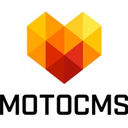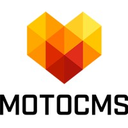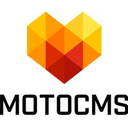Shopify vs MotoCMS (2025 Comparison)

Shopify is a powerful e-commerce platform offering comprehensive features and excellent customer support. Its extensive app marketplace allows for customization, making it ideal for businesses looking to grow their online presence.
- Comprehensive e-commerce features.
- Extensive app marketplace.
- Excellent customer support.
- Higher cost for advanced features.
- Limited design flexibility.
Free plan?
YesStarting price
$5 per month
MotoCMS is a user-friendly website builder with a drag-and-drop interface and affordable pricing. It offers a wide range of templates, making it suitable for users seeking a quick and easy website creation solution.
- User-friendly drag-and-drop builder.
- Affordable pricing plans.
- Wide range of templates.
- Limited e-commerce functionality.
- Fewer integrations available.
Free plan?
YesStarting price
$49 per siteWhat is Shopify?
Shopify is a leading e-commerce platform that empowers businesses to create and manage their online stores with ease. It offers a comprehensive suite of tools, including customizable templates, payment processing, and inventory management, making it ideal for both small and large businesses. Shopify's user-friendly interface and robust features help entrepreneurs streamline their operations, reach a global audience, and boost sales. Whether you're a seasoned retailer or just starting, Shopify provides the flexibility and scalability needed to grow your business effectively.
What is MotoCMS?
MotoCMS is a versatile website builder that caters to users looking for a quick and efficient way to create stunning websites. With its drag-and-drop functionality, MotoCMS allows users to design and customize their sites without any coding knowledge. It offers a wide range of templates and widgets, making it suitable for various industries. MotoCMS helps users save time and effort by providing an intuitive interface and powerful features, enabling them to focus on their content and business goals.
Pros and Cons of Shopify vs MotoCMS

Pros & Cons of Shopify
- Shopify offers a wide range of e-commerce features, including payment processing, inventory management, and marketing tools, making it an all-in-one solution for online retailers.
- With a vast array of third-party apps available, Shopify allows users to customize their online stores and enhance functionality, providing a tailored e-commerce experience.
- Shopify provides 24/7 customer support through various channels, ensuring users receive timely assistance and guidance whenever needed.
- While Shopify offers a range of pricing plans, accessing advanced features and integrations may require higher-tier subscriptions, which can be costly for some users.
- Although Shopify offers customizable templates, some users may find the design options limited compared to other platforms, restricting creative freedom.

Pros & Cons of MotoCMS
- MotoCMS's intuitive drag-and-drop builder allows users to create and customize websites without any coding knowledge, making it accessible to beginners.
- MotoCMS offers competitive pricing plans, providing an affordable option for users looking to build a website without breaking the bank.
- With a diverse selection of templates available, MotoCMS caters to various industries, allowing users to create visually appealing websites that suit their needs.
- While MotoCMS offers basic e-commerce features, it lacks the advanced capabilities of platforms like Shopify, making it less suitable for online retailers.
- MotoCMS provides limited integration options compared to other platforms, which may restrict users looking to enhance their website's functionality.
Shopify vs MotoCMS: At A Glance
Value to Price
Shopify offers excellent value for its price, providing a comprehensive suite of e-commerce tools that cater to businesses of all sizes. Its pricing plans are flexible, allowing users to choose the best fit for their needs. MotoCMS, while affordable, may not offer the same level of e-commerce functionality, making Shopify a better choice for those seeking robust online store features.
Ease of Use
Both Shopify and MotoCMS are user-friendly, but Shopify's intuitive interface and extensive support resources make it slightly easier for beginners. MotoCMS offers a straightforward drag-and-drop builder, but Shopify's comprehensive tutorials and community support give it an edge for those new to website building.
Functionality
Shopify excels in functionality, offering a wide range of e-commerce features, including payment processing, inventory management, and marketing tools. MotoCMS provides essential website building features but lacks the advanced e-commerce capabilities of Shopify, making Shopify the preferred choice for online retailers.
Scalability
Shopify is highly scalable, accommodating businesses as they grow and expand. Its robust infrastructure supports high traffic and large inventories, making it ideal for growing businesses. MotoCMS, while suitable for small to medium-sized websites, may not offer the same scalability for larger e-commerce operations.
Integrations
Shopify offers a vast array of integrations with third-party apps, enhancing its functionality and allowing users to customize their online stores. MotoCMS provides basic integrations, but Shopify's extensive app marketplace makes it the better choice for those seeking a highly customizable e-commerce platform.
Customer Support
Shopify provides excellent customer support, with 24/7 assistance available through various channels. MotoCMS offers reliable support, but Shopify's round-the-clock availability and extensive resources make it the preferred option for users who prioritize customer service.
Security
Both Shopify and MotoCMS prioritize security, but Shopify's advanced security features, including SSL certificates and PCI compliance, provide an added layer of protection for online transactions. MotoCMS offers standard security measures, but Shopify's robust security infrastructure makes it the safer choice for e-commerce businesses.
Overall Rating
Shopify's comprehensive e-commerce features, scalability, and excellent customer support make it the top choice for online retailers. MotoCMS is a solid option for those seeking a straightforward website builder, but Shopify's advanced capabilities and flexibility give it the edge for businesses looking to grow their online presence.
Shopify vs MotoCMS: A Detailed Breakdown of Key Features
Customizable Templates
Shopify offers a wide range of customizable templates that cater to various industries, allowing you to create a unique online store that reflects your brand. MotoCMS also provides a selection of templates, but Shopify's extensive library and flexibility make it the better choice for those seeking a personalized e-commerce experience.
SEO Tools
Shopify's built-in SEO tools help you optimize your online store for search engines, improving visibility and driving traffic. MotoCMS offers basic SEO features, but Shopify's advanced tools and resources make it the preferred option for businesses looking to enhance their online presence.
Mobile Responsiveness
Both Shopify and MotoCMS offer mobile-responsive designs, ensuring your website looks great on any device. However, Shopify's templates are optimized for mobile performance, providing a seamless user experience across all platforms, making it the better choice for mobile-focused businesses.
Payment Processing
Shopify's integrated payment processing system supports multiple payment methods, making it easy for customers to complete transactions. MotoCMS offers basic payment options, but Shopify's comprehensive payment solutions and security features make it the superior choice for e-commerce businesses.
Inventory Management
Shopify's inventory management tools allow you to track and manage your products efficiently, ensuring you never run out of stock. MotoCMS provides basic inventory features, but Shopify's advanced capabilities make it the better option for businesses with large inventories.
Marketing Tools
Shopify offers a range of marketing tools, including email campaigns and social media integration, to help you reach your target audience. MotoCMS provides essential marketing features, but Shopify's comprehensive suite of tools makes it the preferred choice for businesses looking to boost their marketing efforts.
Pricing Comparison of Shopify and MotoCMS
To assist you in making an informed choice, we’ve outlined the pricing plans and essential features of Shopify and MotoCMS. This comparison will highlight the best option for creating your website.

Shopify Pricing Plans
- Create a simple online store with ease.
- Access to basic ecommerce features and tools.
- No setup fees or hidden charges.
- Ideal for testing ecommerce waters.
- 10 inventory locations for better stock management.
- 24/7 chat support for continuous assistance.
- Localized global selling across 3 markets.
- POS Lite for in-person sales.
- 5 additional staff accounts for team collaboration.
- Localized global selling across 3 markets.
- Advanced reporting and analytics tools.
- POS Lite for seamless in-person sales.
- Custom reports and analytics for data-driven decisions.
- 15 additional staff accounts for larger teams.
- 10x checkout capacity for high traffic handling.
- Enhanced 24/7 chat support for priority assistance.
- 200 inventory locations for extensive stock management.
- Priority 24/7 phone support for immediate help.
- Localized global selling across 50 markets.
- Customizable checkout with 40x capacity.

MotoCMS Pricing Plans
- Responsive design ensures compatibility with all devices.
- Access to all widgets and integrations for enhanced functionality.
- 24/7 support for uninterrupted assistance.
- Single page design for focused content presentation.
- Unlimited pages for extensive content and product listings.
- Comprehensive widgets and integrations for e-commerce.
- 24/7 support for continuous assistance.
- Ecommerce dashboard with sales statistics for insights.
- Responsive design for optimal viewing on all devices.
- Access to all widgets and integrations for versatility.
- 24/7 support for reliable assistance.
- 6-13 pre-designed pages with unlimited additional pages.
Our Rating Methodology
We thoroughly test each website builder, evaluating key features like ease of use, functionality, and scalability. We also analyze user reviews to ensure our recommendations fit your needs. Each of the seven evaluation factors is weighted by importance to provide an accurate final rating, helping you avoid poor-quality tools and make informed decisions.
Shopify or MotoCMS: Which One Matches Your Business Needs?
Choose Shopify If You Need ...
- Advanced e-commerce features
If you are a business owner looking for advanced e-commerce features, Shopify is the ideal choice. Its comprehensive suite of tools, including payment processing and inventory management, makes it perfect for online retailers seeking to grow their business.
- Scalable online store solution
If you are a growing business in need of a scalable online store solution, Shopify is the best option. Its robust infrastructure and support for high traffic make it suitable for businesses planning to expand their online presence.
Choose MotoCMS If You Need ...
- User-friendly website builder
If you are a beginner or small business owner looking for an easy-to-use website builder, MotoCMS is the right choice. Its drag-and-drop interface and affordable pricing make it accessible to users with limited technical skills.
- Quick website creation
If you are a user seeking a quick and efficient way to create a website, MotoCMS is the perfect solution. Its wide range of templates and intuitive builder allow you to design and launch your site in no time.
Frequently Asked Questions
 Which platform is better for e-commerce, Shopify or MotoCMS?
Which platform is better for e-commerce, Shopify or MotoCMS?
 Is MotoCMS suitable for beginners?
Is MotoCMS suitable for beginners?
 Can Shopify handle high traffic and large inventories?
Can Shopify handle high traffic and large inventories?
 Does MotoCMS offer e-commerce features?
Does MotoCMS offer e-commerce features?
 Which platform offers better customer support, Shopify or MotoCMS?
Which platform offers better customer support, Shopify or MotoCMS?
 Are there any limitations to Shopify's design flexibility?
Are there any limitations to Shopify's design flexibility?

Martin Lunendonk
Martin Lunendonk is a senior tech writer specializing in website builders, web hosting, and ecommerce platforms. With a background in finance, accounting, and philosophy, he has founded multiple tech startups and worked in medium to large tech companies and investment banking, bringing deep expertise and reliable insights to his software reviews.



